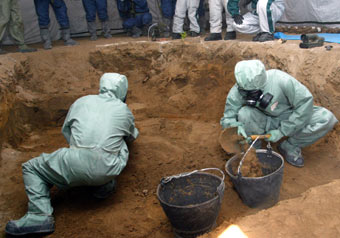Invading Japanese troops discarded or buried at least 2 million
chemical weapons in China in the 1940s when they retreated, according to Chinese
experts.

Chinese experts
work at an excavation site where up to 500 gas
bombs have been detected underground Friday, june 18, 2004 in
Qiqihar, northeast China's Heilongjiang Province.
[newsphoto] |
The weapons -- some still lethal
or toxic after decades have passed -- remain a threat to Chinese across the
country. Leakage accidents involving injuries or deaths are reported now and
then.
An August 4 incident that killed one man and injured 43 residents in Qiqihar
of Northeast China's Heilongjiang Province last year. More than 50 bombs,
including chemical weapons, were found last month in a village near the same
city.
"The facts have proved again that we have come to a situation where no more
delays can be tolerated," said Ge Guangbiao, director of the Japanese-abandoned
chemical weapons disposal office under the Chinese Foreign Ministry.
China and Japan signed a Chemical Weapons Convention in 1997 and a memorandum
two years later. Japan promised to finish the work of disposing of all chemical
weapons it abandoned in China by 2007.
But the Chinese side has been complaining about the Japanese Government's
insincerity in not finishing the work in time.
"We have to say they are too slow in disposing of the weapons," said Ge.
So far, only 36,000 chemical weapons have been retrieved and put under
temporary safekeeping, according to Japan's office for the disposal of abandoned
chemical weapons.
This is a small part of all Japanese-abandoned weapons, which even Japan
estimates at around 700,000.
Chinese experts are calling on the Japanese Government to reveal burial sites
of all its abandoned weapons to avoid further harm to Chinese.
"But the Japanese Government has never told us the exact locations of its
weapons, which makes it extremely difficult for us to find them," said Bu Qing,
vice-president of the provincial academy of social sciences in Heilongjiang.
The Foreign Ministry on Friday opened the heavily guarded excavation site in
Touzhan Village of Ang'angxi District to a group of journalists.
Wearing protective gears, the journalists were shown to the dozen tents in
which chemical weapons personnel removed, transferred, inspected, packed and
stored the weapons.
The weapons will be moved to a larger temporary storage house in suburban
Qiqihar, waiting for future destruction.
Although some 50 bombs were dug up last month by a villager and reburied soon
after, Chinese weapon experts said a survey showed at least 500 bombs were lying
under the earth.
About 25 Japanese experts and 150 Chinese military personnel started to
excavate the bombs on Thursday, but they did not dig up any weapons.
Eleven chemical bombs were excavated on Friday.
But Japanese experts confirmed later that only 10 chemical weapons were found
on Friday.
The work is expected to wrap up in 10 days.
Disposal plant planned
Japan is planning to build a large plant in East China's Dunhua to
retrieve chemical weapons which were believed to account for 90 per cent of all
the Japanese-abandoned chemical weapons during World War II.
"The initial design has been finished, and the project will soon begin,"
Aoyama Akihiko, an official with Japan's special office for abandoned chemical
weapon disposal, told China Daily.
He said the Japanese Government expects to finish the work of excavating and
retrieving the chemical weapons in Harba Hill in Dunhua in two or three years.
The destruction of the weapons will be carried out after that.
According to historical records and the result of survey, Japan estimates
that there are about 670,000 chemical weapons in Harba, accounting to 90 per
cent of all Japanese abandoned chemical weapons in China.
"We hope to finish the disposal as soon as possible in order to avoid further
tragedies," said Akihiko.
| |
 |
|
 |
|
|
Today's
Top News |
|
|
|
Top China
News |
 |
|
 |
|
|
|
|
|